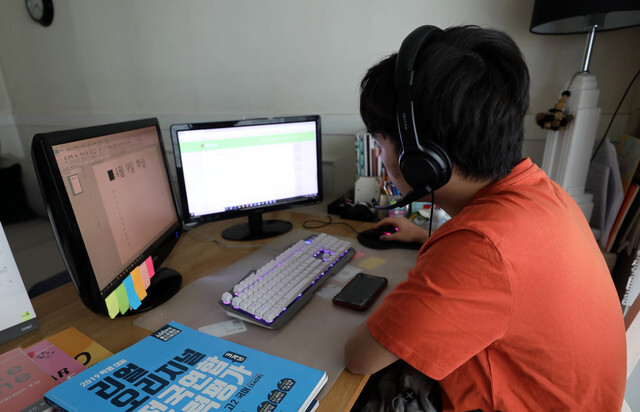hankyoreh
Links to other country sites 다른 나라 사이트 링크
[Editorial] Education leaders need to use remote learning as opportunity for innovation

On Apr. 9, South Korean students in the third year of middle and high schools around the country began their spring semester online. As expected, there were a number of misfires and mistakes, including login delays and misuse of digital devices, but the first day of online classes wrapped up without any major incidents or confusion. According to provisional figures provided by the Ministry of Education, more than 99% of students took part in the online classes. Despite limited time to prepare, the dedication of each school and teacher, the active cooperation from students, and the efforts of education authorities appear to have gotten the semester off on the right foot, without any serious trouble.
The biggest problem that was witnessed on Thursday had been predicted in advance: frequent delays in logging into websites. While the Ministry of Education claimed the previous day that it had finished upgrading its servers to allow 3 million simultaneous users, students at many schools weren’t able to connect in time for class or found that video content cut off in the middle.
A rush of morning users in EBS Online Class, the system used for managing online studies, also caused logins to be delayed for an hour. Fortunately, the cause of the delay was reportedly identified in the afternoon, but the issue of videos cutting off midstream hasn’t been completely addressed. While it’s true that there are bound to be a few hiccups at the launch of any new project, the prolongation of such technical issues could add to students’ and parents’ anxiety. Quick action should be taken to resolve these issues.
Disparities were also witnessed in the level of preparedness at various schools. Some schools, including special purpose schools and autonomous private schools, had been using video recording equipment to work on online classes since March; those schools held interactive classes with a range of content. But schools with inadequate equipment and technology just replayed lectures from EBS, to the frustration of students and parents. The government needs to pay even more attention to developing infrastructure, to ensure that the digital divide between schools doesn’t lead to a gap in academic quality.
The fact that teachers and students were all in separate locations also created difficulties for managing students. We’re obliged to take issue with the fact that some private academies — including famous academies in Seoul’s Gangnam and Mokdong areas — provided students with physical spaces to take their “online classes.” That goes against the whole purpose of holding classes remotely, a necessary measure to stop the coronavirus from spreading, and it demands stern action by the education authorities.
Next week, students in the fourth grade of elementary school and above will be starting their online semesters. The educational authorities need to find a quick solution to these technical issues; teachers need to conduct diligent research into class instruction and student management; and students and parents need to exercise patience and cooperation. All three of those things must come together if we’re to turn this unprecedented online semester into an opportunity for meaningful innovation in education.
Please direct comments or questions to [english@hani.co.kr]

Editorial・opinion
![[Column] Season 2 of special prosecutor probe may be coming to Korea soon [Column] Season 2 of special prosecutor probe may be coming to Korea soon](https://flexible.img.hani.co.kr/flexible/normal/500/300/imgdb/original/2024/0426/3317141030699447.jpg) [Column] Season 2 of special prosecutor probe may be coming to Korea soon
[Column] Season 2 of special prosecutor probe may be coming to Korea soon![[Column] Park Geun-hye déjà vu in Yoon Suk-yeol [Column] Park Geun-hye déjà vu in Yoon Suk-yeol](https://flexible.img.hani.co.kr/flexible/normal/500/300/imgdb/original/2024/0424/651713945113788.jpg) [Column] Park Geun-hye déjà vu in Yoon Suk-yeol
[Column] Park Geun-hye déjà vu in Yoon Suk-yeol- [Editorial] New weight of N. Korea’s nuclear threats makes dialogue all the more urgent
- [Guest essay] The real reason Korea’s new right wants to dub Rhee a founding father
- [Column] ‘Choson’: Is it time we start referring to N. Korea in its own terms?
- [Editorial] Japan’s rewriting of history with Korea has gone too far
- [Column] The president’s questionable capacity for dialogue
- [Column] Are chaebol firms just pizza pies for families to divvy up as they please?
- [Column] Has Korea, too, crossed the Rubicon on China?
- [Correspondent’s column] In Japan’s alliance with US, echoes of its past alliances with UK
Most viewed articles
- 1After election rout, Yoon’s left with 3 choices for dealing with the opposition
- 2Why Kim Jong-un is scrapping the term ‘Day of the Sun’ and toning down fanfare for predecessors
- 3Two factors that’ll decide if Korea’s economy keeps on its upward trend
- 4Noting shared ‘values,’ Korea hints at passport-free travel with Japan
- 5AI is catching up with humans at a ‘shocking’ rate
- 6Why Korea shouldn’t welcome Japan’s newly beefed up defense cooperation with US
- 7‘We must say no’: Seoul defense chief on Korean, USFK involvement in hypothetical Taiwan crisis
- 8Exchange rate, oil prices, inflation: Can Korea overcome an economic triple whammy?
- 9Terry Anderson, AP reporter who informed world of massacre in Gwangju, dies at 76
- 10[Reportage] On US campuses, student risk arrest as they call for divestment from Israel